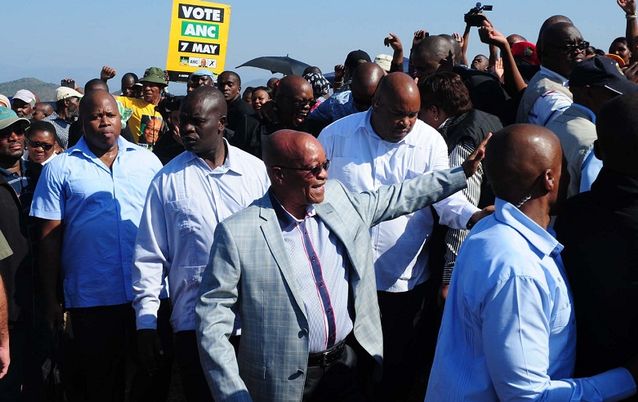WHAT happens inside the African National Congress (ANC) remains more important to our political future than what happens outside it. At the time this was written, many election results were still outstanding. But those that were available, with the usually reliable mathematical projections of the Council for Scientific and Industrial Research, told the likely story.
The ANC vote dropped by two or three percentage points but largely held up.
The Democratic Alliance (DA) did much better compared with 2009 but not in comparison to the 2011 local government elections.
The Economic Freedom Fighters (EFF), despite the love of sections of the media and most commentators, fared significantly worse than the Congress of the People (COPE) did in 2009.
The smaller parties hung onto seats ensuring that, despite much talk of a "two-party system" (which is just about impossible if the electoral system awards a seat for 0.25% of the vote), there could be 10 parties in the new National Assembly; about 15% of voters will be represented by smaller parties.
The first message this result sends is that much of our debate remains out of touch with much of the country: how else do we explain the strange reality of a national debate (outside the public broadcaster) in which a party supported by almost two in three voters has virtually no voice?
The second is that politics will not be changed by a bleeding of ANC votes to the present opposition. The opposition had everything going for it this time. The ANC acknowledged that many of its supporters were unhappy with leaders who, in these voters’ eyes, seemed more interested in looking after themselves than voters.
The Congress of South African Trade Unions (Cosatu), traditionally a key source of organisation for the ANC election effort, is divided and its largest affiliate, the National Union of Metalworkers of SA, refused to campaign for the ANC.
The ANC Youth League, a key source of energy at election time, has been reduced to a shell, presided over by a leadership elected by no one. Marikana, e-tolls and Nkandla angered workers, the middle class and grass-roots voters respectively.
If, despite all this, the ANC suffers only a minor loss, it is hard to see how the opposition parties it faces at present will threaten its majority in the future.
The DA’s performance illustrates this.
Yes, it has grown in each election since 1999. But the growth is too slow to threaten the ANC, and much of it comes from other opposition parties anyway.
If we assume that the votes the ANC did lose went mainly to the EFF, the DA may have won few if any votes from the governing party. One reason it has not met its own growth expectations is that there are just so many votes it can win from other opposition parties: the Inkatha Freedom Party, the National Freedom Party, COPE, the United Democratic Movement (UDM), the Freedom Front Plus and the African Christian Democratic Party may have shrunk as their members were persuaded that the DA was a better bet. But most of them represent niches in the electorate and so will not be folded into the official opposition.
The DA may well have an important role in our future — but as a coalition partner, not a national election winner.
While it is no longer fashionable to mention Agang SA, at the outset it was also seen as a credible magnet for black voters unhappy with the ANC. But parties that have no roots in the ANC constituency will not be able to challenge it.
All of this means that our politics will shift only if the ANC splits again, so that there are at least two credible parties competing for the majority of voters who remain loyal to its history (if not its present leadership).
Most of us probably know this instinctively, which explains the inflated expectations that greeted the three ANC breakaways, the UDM, COPE and the EFF.
In each case, it was expected that the ANC would have to compete for its traditional vote with a rival with which its voters could identify. All three underperformed because they did not take a significant chunk of the ANC constituency with them.
The EFF’s prospects were also vastly overblown because those who shape opinions tend to assume that the poor are prone to unreason and are easy prey for anyone with a populist message. Its failure, by some margin, to outdo a party formed in 2008 just months before an election and which chose a political unknown as its presidential candidate is a warning against misunderstanding and undervaluing people who live in poverty — and against assuming that the small universe that inhabits social media is the entire country.
That said, the clear message of this election is that the ANC is yet to face the challenge from within that could endanger its majority. Whether that challenge emerges in the next few years will depend on two factors, both internal to the ANC family.
First, how it manages its factions after the election. Big wins can be a curse to a divided party: they may set off battles for positions which, if not defused, could prompt a split. The key will be how it handles likely clashes between the ambitions of KwaZulu-Natal and the other provinces, and how it balances the need to keep those who lost at its last conference in the movement with rewarding those who backed the winners.
Second, whether the battle within Cosatu is contained. If it is not, a new union federation and workers’ party remain possible. If COPE was able last time to win 7.5% in a few months after a major strategic blunder, it is not impossible that a labour party formed a couple of years ahead of the poll could win enough to threaten the ANC majority.
So, if we want a sense of where our politics is headed, we need to look at the tensions within the ANC rather than the challenges it faces from outside.
The ANC’s performance raises an immediate question — whether doing better than expected will lull it into complacency. In the run-up to the poll, an ANC nervous of losing ground began to try harder to woo voters — one consequence was a desire to show that it was serious about making government work better.
Will its leaders interpret the election result to mean that the crisis is over and that there is no need to woo voters urgently? Will jockeying for position ahead of the election in 2017 of a new ANC president take precedence over connecting with voters?
If so, one casualty may be its interest in negotiating with business a way to address the poverty and inequality that afflict many voters without damaging the economy.
If ANC politicians do choose to see this election as a mandate to continue the patterns of the past few years, they may hasten the split, which alone can challenge their majority. If its politicians remain concerned about themselves rather than voters, it could find itself challenged by a more substantial breakaway than we have seen so far.
This election did not challenge the ANC’s dominance at the polls. But, if the result convinces its leaders that they no longer have to worry about the problems caused by politicians who put themselves before the country, it may open the way for far more competition in the next election than we have seen in this one.
• Friedman is director of the Centre for the Study of Democracy.

President Jacob Zuma, centre, casting his vote at Ntolwane Primary School in Nkandla, KwaZulu-Natal, on Wednesday. Picture: GCIS
WHAT happens inside the African National Congress (ANC) remains more important to our political future than what happens outside it. At the time this was written, many election results were still outstanding. But those that were available, with the usually reliable mathematical projections of the Council for Scientific and Industrial Research, told the likely story.
The ANC vote dropped by two or three percentage points but largely held up.
The Democratic Alliance (DA) did much better compared with 2009 but not in comparison to the 2011 local government elections.
The Economic Freedom Fighters (EFF), despite the love of sections of the media and most commentators, fared significantly worse than the Congress of the People (COPE) did in 2009.
The smaller parties hung onto seats ensuring that, despite much talk of a "two-party system" (which is just about impossible if the electoral system awards a seat for 0.25% of the vote), there could be 10 parties in the new National Assembly; about 15% of voters will be represented by smaller parties.
The first message this result sends is that much of our debate remains out of touch with much of the country: how else do we explain the strange reality of a national debate (outside the public broadcaster) in which a party supported by almost two in three voters has virtually no voice?
The second is that politics will not be changed by a bleeding of ANC votes to the present opposition. The opposition had everything going for it this time. The ANC acknowledged that many of its supporters were unhappy with leaders who, in these voters’ eyes, seemed more interested in looking after themselves than voters.
The Congress of South African Trade Unions (Cosatu), traditionally a key source of organisation for the ANC election effort, is divided and its largest affiliate, the National Union of Metalworkers of SA, refused to campaign for the ANC.
The ANC Youth League, a key source of energy at election time, has been reduced to a shell, presided over by a leadership elected by no one. Marikana, e-tolls and Nkandla angered workers, the middle class and grass-roots voters respectively.
If, despite all this, the ANC suffers only a minor loss, it is hard to see how the opposition parties it faces at present will threaten its majority in the future.
The DA’s performance illustrates this.
Yes, it has grown in each election since 1999. But the growth is too slow to threaten the ANC, and much of it comes from other opposition parties anyway.
If we assume that the votes the ANC did lose went mainly to the EFF, the DA may have won few if any votes from the governing party. One reason it has not met its own growth expectations is that there are just so many votes it can win from other opposition parties: the Inkatha Freedom Party, the National Freedom Party, COPE, the United Democratic Movement (UDM), the Freedom Front Plus and the African Christian Democratic Party may have shrunk as their members were persuaded that the DA was a better bet. But most of them represent niches in the electorate and so will not be folded into the official opposition.
The DA may well have an important role in our future — but as a coalition partner, not a national election winner.
While it is no longer fashionable to mention Agang SA, at the outset it was also seen as a credible magnet for black voters unhappy with the ANC. But parties that have no roots in the ANC constituency will not be able to challenge it.
All of this means that our politics will shift only if the ANC splits again, so that there are at least two credible parties competing for the majority of voters who remain loyal to its history (if not its present leadership).
Most of us probably know this instinctively, which explains the inflated expectations that greeted the three ANC breakaways, the UDM, COPE and the EFF.
In each case, it was expected that the ANC would have to compete for its traditional vote with a rival with which its voters could identify. All three underperformed because they did not take a significant chunk of the ANC constituency with them.
The EFF’s prospects were also vastly overblown because those who shape opinions tend to assume that the poor are prone to unreason and are easy prey for anyone with a populist message. Its failure, by some margin, to outdo a party formed in 2008 just months before an election and which chose a political unknown as its presidential candidate is a warning against misunderstanding and undervaluing people who live in poverty — and against assuming that the small universe that inhabits social media is the entire country.
That said, the clear message of this election is that the ANC is yet to face the challenge from within that could endanger its majority. Whether that challenge emerges in the next few years will depend on two factors, both internal to the ANC family.
First, how it manages its factions after the election. Big wins can be a curse to a divided party: they may set off battles for positions which, if not defused, could prompt a split. The key will be how it handles likely clashes between the ambitions of KwaZulu-Natal and the other provinces, and how it balances the need to keep those who lost at its last conference in the movement with rewarding those who backed the winners.
Second, whether the battle within Cosatu is contained. If it is not, a new union federation and workers’ party remain possible. If COPE was able last time to win 7.5% in a few months after a major strategic blunder, it is not impossible that a labour party formed a couple of years ahead of the poll could win enough to threaten the ANC majority.
So, if we want a sense of where our politics is headed, we need to look at the tensions within the ANC rather than the challenges it faces from outside.
The ANC’s performance raises an immediate question — whether doing better than expected will lull it into complacency. In the run-up to the poll, an ANC nervous of losing ground began to try harder to woo voters — one consequence was a desire to show that it was serious about making government work better.
Will its leaders interpret the election result to mean that the crisis is over and that there is no need to woo voters urgently? Will jockeying for position ahead of the election in 2017 of a new ANC president take precedence over connecting with voters?
If so, one casualty may be its interest in negotiating with business a way to address the poverty and inequality that afflict many voters without damaging the economy.
If ANC politicians do choose to see this election as a mandate to continue the patterns of the past few years, they may hasten the split, which alone can challenge their majority. If its politicians remain concerned about themselves rather than voters, it could find itself challenged by a more substantial breakaway than we have seen so far.
This election did not challenge the ANC’s dominance at the polls. But, if the result convinces its leaders that they no longer have to worry about the problems caused by politicians who put themselves before the country, it may open the way for far more competition in the next election than we have seen in this one.
• Friedman is director of the Centre for the Study of Democracy.














 News, views and analysis of South Africa's national and provincial elections
News, views and analysis of South Africa's national and provincial elections










Change: -0.47%
Change: -0.57%
Change: -1.76%
Change: -0.34%
Change: 0.02%
Data supplied by Profile Data
Change: -1.22%
Change: -0.40%
Change: -0.47%
Change: 0.00%
Change: -0.39%
Data supplied by Profile Data
Change: 1.21%
Change: 1.36%
Change: 0.95%
Change: 0.73%
Change: 1.17%
Data supplied by Profile Data
Change: 0.02%
Change: -0.52%
Change: 0.26%
Change: -1.21%
Change: -1.48%
Data supplied by Profile Data